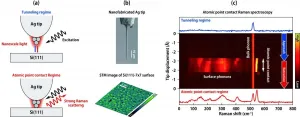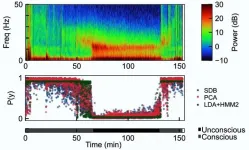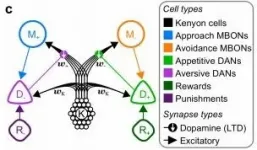(Press-News.org) May 7, 2021 - Early in the COVID-19 pandemic, healthcare systems scrambled to modify patient care processes - particularly when it came to strategies aimed at reducing the risk of hospital-related complications. A look at how one hospital applied its learning health system (LHS) framework to respond to a COVID-19-related increase in hospital-acquired pressure injuries (HAPIs) is presented in the May/June Journal for Healthcare Quality (JHQ), the peer-reviewed journal of the National Association for Healthcare Quality (NAHQ). The journal is published in the Lippincott portfolio by Wolters Kluwer.
"Given the significant challenges that pressure injuries may pose to the hospitalized patient, healthcare providers and leaders are faced with the task of HAPI risk mitigation that factors in the unknowns of the COVID pandemic," write Shea Polancich, PhD, RN, and colleagues of University of Alabama at Birmingham. Their experience shows how an LHS approach can support healthcare systems in reducing the risk of HAPIs and other preventable complications, with beneficial effects on patient care and reimbursement.
Using the LHS model improved care delivery - Even during a pandemic
Dr. Polancich and colleagues reviewed electronic health record data of 772 patients who were discharged from their academic medical center from March through July 2020 to gain insights into the prevalence of HAPIs and the efficacy of the organization's 4-year HAPI improvement efforts, based on an LHS model. About 29 percent of patients included in the analysis were diagnosed with COVID-19.
After the start of the pandemic, HAPI numbers began to increase steadily: from 56 cases in March to a peak of 90 cases in May. The researchers believe the increase in HAPIs was related to changes in organizational workflow and processes for evaluating wounds in the early weeks of the pandemic. For example, to reduce COVID-19 exposure and preserve personal protective equipment, the Wound, Ostomy, and Continence (WOC) team used iPads outside patient rooms for remote assessment.
Limited ability to directly observe, touch, and treat patients may have resulted in less-effective management of pressure injuries. Restricted visits by family members or other caregivers - an important set of "eyes and ears" at the patient's bedside - might also have contributed to the increase in HAPIs.
As the nursing leadership team identified opportunities for improvement, workflow and care processes were quickly adapted. Forty-two percent of HAPI cases in COVID patients were potentially related to positioning or devices affecting the face, head, and neck - possibly linked to placing COVID patients in prone position in order to increase aeration of the lungs. The problem was addressed by using silicon adhesive dressings to relieve pressure points in areas above the neck.
With changes in nursing practice and a gradual return to normal hospital operations, HAPI case numbers started to decline in June, reaching a low of 51 events by the end of July. That corresponded to a 45 percent decrease in the total number of HAPIs.
About 37 percent of COVID-19-related HAPIs were stage 3 or above. Hospitals are not eligible to receive full reimbursement from the Centers for Medicare and Medicaid Services for advanced-stage HAPIs - making pressure injuries an important management target.
"Fluctuations and variations in the number of HAPIs during the study period likely occurred due to organizational learning about how to manage patients with COVID 19," the researchers write. By following the LHS model, their hospital was able to identify gaps in patient care in real time and apply the learned information to improve future care delivery. Dr. Polancich and colleagues conclude: "This case study demonstrates the importance of health systems being able to quickly assess and document a problem, deploy resources to fix the problem, as well as evaluate the effectiveness of an intervention."
INFORMATION:
Click here to read "Learning During Crisis: The Impact of COVID-19 on Hospital-Acquired Pressure Injury Incidence."
DOI: 10.1097/JHQ.0000000000000301
INFORMATION:
About the Journal for Healthcare Quality
The Journal for Healthcare Quality (JHQ), a peer-reviewed journal, is an official publication of the National Association for Healthcare Quality. (NAHQ). JHQ is a professional forum that continuously advances healthcare quality practice in diverse and changing environments, and is the first choice for creative and scientific solutions in the pursuit of healthcare quality. The Journal publishes scholarly articles that are targeted to leaders of all healthcare settings, leveraging applied research and producing practical, timely and impactful evidence in healthcare system transformation.
About NAHQ
NAHQ is the leader in healthcare quality competencies. NAHQ provides a strategic advantage to healthcare professionals and the organizations they serve by developing and evolving competencies in healthcare quality that result in better patient and financial outcomes to support the goals of healthcare value. NAHQ offers the industry standard certification in healthcare quality, extensive educational programming, networking opportunities, and career resources to help healthcare professionals meet the challenges they face. Learn more about NAHQ at nahq.org.
About Wolters Kluwer
Wolters Kluwer (WKL) is a global leader in professional information, software solutions, and services for the clinicians, nurses, accountants, lawyers, and tax, finance, audit, risk, compliance, and regulatory sectors. We help our customers make critical decisions every day by providing expert solutions that combine deep domain knowledge with advanced technology and services.
Wolters Kluwer reported 2020 annual revenues of €4.6 billion. The group serves customers in over 180 countries, maintains operations in over 40 countries, and employs approximately 19,200 people worldwide. The company is headquartered in Alphen aan den Rijn, the Netherlands.
Wolters Kluwer provides trusted clinical technology and evidence-based solutions that engage clinicians, patients, researchers and students in effective decision-making and outcomes across healthcare. We support clinical effectiveness, learning and research, clinical surveillance and compliance, as well as data solutions. For more information about our solutions, visit https://www.wolterskluwer.com/en/health and follow us on LinkedIn and Twitter @WKHealth.
For more information, visit http://www.wolterskluwer.com, follow us on Twitter, Facebook, LinkedIn, and YouTube.
Today, deliveries via cesarean sections, or c-sections, have become quite common globally. Sometimes, c-sections are a medical necessity when normal deliveries become risky either for the mother or the baby. At other times, it can be a choice. C-sections today have become a considerably safer procedure than it was a few decades ago, but there is need to refine it further.
In a END ...
Children ages two to five who have the most common form of cystic fibrosis (CF), caused by two copies of the F508 gene mutation, have not had any modulator treatments available to them until recently. A new study authored by researchers at Children's Hospital Colorado and published May 6, 2021, in Lancet Respiratory Medicine shows that the CFTR modulator - lumacaftor/ivacaftor - can be safe and well-tolerated for this age range for up to 120 weeks, allowing younger children to begin proactive treatment of CF earlier in their lives.
CF affects more than 70,000 people worldwide and is a chronic, progressive, life-shortening genetic disease caused by an absent or defective protein called the CF transmembrane conductance regulator (CFTR) protein, resulting from mutations in both copies ...
Despite their extremely small size, submicron atmospheric aerosols are critical pollutants with climate change, air quality, and human health implications. Of these particles, secondary organic aerosols (SOA) form when volatile organic compounds (VOCs) oxidize to lower volatility products that bond with and increase aerosol particle size, or in some cases, they may simply exist by themselves. SOA constitutes a significant fraction of the global aerosol mass. Scientists are attempting to improve future aerosol modeling, but several discrepancies still exist between model-simulated and field-observed SOA budgets.
''Large uncertainties in model assessments of SOA budgets and correspondingly, its climate effects, ...
Nanofabrication of electronic devices has reached a single nanometer scale (10-9 m). The rapid advancement of nanoscience and nanotechnology now requires atomic-scale optical spectroscopy in order to characterize atomistic structures that will affect the properties and functions of the electronic devices.
The international team headed by Takashi Kumagai at Institute for Molecular Science discovered a huge enhancement of Raman scattering mediated by a formation of an atomic point contact between a plasmonic silver tip and a Si(111)-7×7 reconstructed surface. This was achieved by means of state-of-the-art low-temperature tip-enhanced ...
Anesthestic drugs act on the brain but most anesthesiologists rely on heart rate, respiratory rate, and movement to infer whether surgery patients remain unconscious to the desired degree. In a new study, a research team based at MIT and Massachusetts General Hospital shows that a straightforward artificial intelligence approach, attuned to the kind of anesthetic being used, can yield algorithms that assess unconsciousness in patients based on brain activity with high accuracy and reliability.
"One of the things that is foremost in the minds of anesthesiologists is 'Do I have somebody who is lying in front of me who may be conscious and I don't realize it?' Being ...
Even the humble fruit fly craves a dose of the happy hormone, according to a new study from the University of Sussex which shows how they may use dopamine to learn in a similar manner to humans.
Informatics experts at the University of Sussex have developed a new computational model that demonstrates a long sought after link between insect and mammalian learning, as detailed in a new paper published today in Nature Communications.
Incorporating anatomical and functional data from recent experiments, Dr James Bennett and colleagues modelled how the anatomy and physiology of the fruit fly's brain can support learning according to the reward prediction error (RPE) hypothesis.
The computational model indicates how dopamine neurons in an area of ...
PITTSBURGH, May 7, 2021 - In a paper published today in Nature Communications, an international group of collaborators led by researchers at UPMC Children's Hospital of Pittsburgh have identified a genetic cause of a rare neurological disorder marked by developmental delay and loss of coordination, or ataxia.
The disorder, scientists found, is caused by mutations in a protein called GEMIN5--one of the key building blocks of a protein complex that controls RNA metabolism in neurons. No mutations in GEMIN5 were previously linked to any genetic disease. ...
Luxembourg, 7 May 2021 - In a new position statement, Alzheimer Europe has issued a call for prioritisation of people with dementia and their carers in national COVID-19 vaccination strategies, urging governments to recognise the disproportionate effect of the pandemic on these groups.
Alzheimer Europe has today issued a call for people with dementia and their carers to be given priority in the ongoing COVID-19 vaccination campaigns across Europe.
In its position statement, Alzheimer Europe notes that people with dementia have almost twice the risk for developing COVID-19 compared to their ...
Systemic inequalities mean that low-income households in London are more likely to be exposed to higher levels of indoor air pollution, according to a report by UCL researchers.
The biggest factors are the quality of housing and the characteristics of the surrounding environment, taking location and levels of outdoor air pollution into account - factors beyond occupants' control.
Air pollution exposure is the greatest environmental health threat in the UK, with long-term exposures estimated to cause 28,000-36,000 premature deaths a year.
In the paper, published in Buildings and Cities, researchers used available data and models, assembling evidence to examine five factors explaining why lower socio-economic groups may be exposed to higher levels of indoor air pollution ...
LUGANO, 7 May, 2021- Findings presented at today's EADV 2021 Spring Symposium suggest that an imbalance in gut microbiota (dysbiosis), could play a significant role in the progression of inflammatory skin disease, Hidradenitis Suppurativa (HS). HS is a painful, long-term skin condition, with a chronic and relapsing nature that significantly impacts patients' quality of life.
Researchers at Hacettepe University collected faecal samples from 15 patients with HS and 15 age and sex matched healthy individuals and analysed regions of the bacterial 16S rRNA gene to investigate ...







